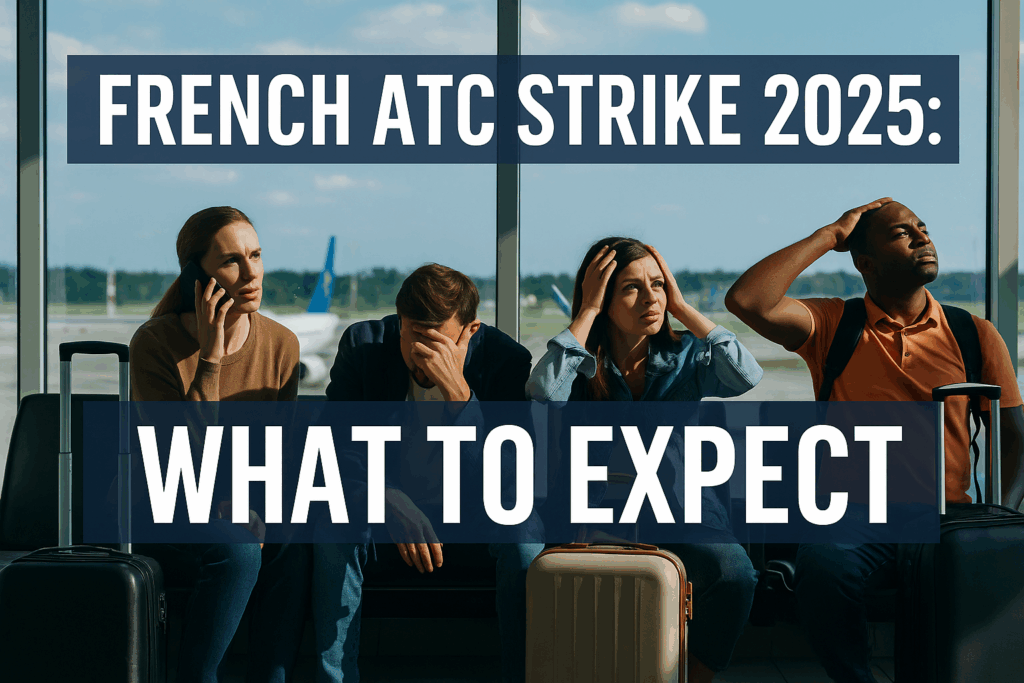French ATC Strike 2025: How Europe’s Summer Flights Are Being Disrupted
Focus keyword: french ATC strike 2025
The summer travel season is in full swing, but across Europe, travellers are facing long delays, cancelled flights, and growing frustration. The cause? A widespread French ATC strike in 2025, which has already forced hundreds of airlines to cancel or reroute flights passing through French airspace. Whether you’re a passenger, pilot, or airline operator, this strike is already having a ripple effect far beyond France.
In this article, we break down what’s happening, who it affects, and what you need to know.
Why Are French Air Traffic Controllers on Strike?
The current strike began in early July 2025 after months of tension between French aviation unions and the government. ATC workers are demanding better pay, improved working conditions, and increased staffing levels to manage post-pandemic air traffic recovery.
Controllers argue that with air traffic nearing record levels, the current workforce is stretched thin, putting both safety and efficiency at risk.
According to Reuters, the union Syndicat National des Contrôleurs du Trafic Aérien (SNCTA) announced a series of rolling strikes throughout the summer, with no clear end date in sight.
📎 Source: Reuters – France air traffic control strike disrupts flights
What Flights Are Affected?
You don’t have to be flying to or from France to feel the impact. Because a large portion of European airspace passes through France, thousands of flights that normally transit this zone have been delayed or rerouted.
Here’s what passengers and airlines are experiencing:
-
Delays on UK to Spain, Italy, Portugal, and Greece routes
-
Cancellations from Ryanair, British Airways, Lufthansa, and Air France
-
Increased fuel costs for airlines forced to reroute around French airspace
-
Airport congestion at major European hubs
Eurocontrol, the European air navigation agency, reports that traffic levels through French airspace have dropped by over 25 percent this week alone.
Airline and Crew Response to the Strike
Airlines across Europe have responded with a mix of caution and frustration.
-
Ryanair CEO Michael O’Leary called on the EU to protect overflights during ATC strikes, arguing that “it’s outrageous that a strike in France can ground flights between Ireland and Italy.”
-
British Airways has issued multiple travel waivers, allowing passengers to rebook without fees.
-
Pilots and cabin crew are facing additional operational challenges, including altered duty schedules, extended delays, and in some cases, last-minute aircraft swaps or overnight stays.
Many crews are being re-routed through alternative airspace corridors, increasing fatigue and logistical complexity for airline planning teams.
What Should Passengers Do?
If you’re travelling this summer, here are steps you can take to stay informed and minimise disruption:
1. Check Flight Status Regularly
Most airlines are updating passengers in real-time via SMS, apps, or email. Always check your departure and arrival airports before leaving home.
2. Know Your Rights
Under EU Regulation 261, passengers affected by cancellations or long delays may be entitled to compensation unless the disruption is deemed extraordinary. A strike by airport staff is generally considered within the airline’s control if it involves subcontracted services—but air traffic control strikes are often considered outside of airline control.
For more details, visit:
👉 European Consumer Centre – Flight Rights
3. Plan Buffer Time
If you have a connecting flight, consider rescheduling to allow for longer layovers. Most delays due to rerouting are in the range of 30 to 90 minutes, but some exceed two hours.
How Long Will the Strike Last?
As of July 5, the ATC strike is ongoing with no confirmed resolution. French unions have announced a series of rolling strike dates, often giving only 48 hours’ notice. This uncertainty makes it difficult for airlines to plan and for passengers to travel with confidence.
The European Commission is under increasing pressure to develop a coordinated plan for handling cross-border ATC strikes and protecting airspace access.
Impact on the Aviation Industry
The French ATC strike 2025 is the latest in a series of events highlighting the fragility of Europe’s aviation network. The disruption is:
-
Costing airlines millions in rerouting, crew overtime, and passenger compensation
-
Raising safety concerns due to increased pressure on remaining airspace corridors
-
Delaying cargo shipments and business travel at the peak of summer
Airlines and trade associations like IATA and ACI Europe are calling for urgent reforms to allow overflight rights during national strikes, similar to airspace protections in the United States.
What Happens Next?
Passengers, airlines, and aviation authorities are watching closely. Some short-term solutions include:
-
Enhanced coordination among European ATC services
-
Temporary use of military corridors to ease congestion
-
Mediation talks between unions and the French government
But longer-term, this strike may accelerate reforms in air traffic control staffing and infrastructure across the EU.
Conclusion
The French ATC strike in 2025 is a major disruption affecting travellers across Europe. As delays mount and frustration grows, the aviation industry faces urgent questions about how to modernise air traffic services, protect passengers, and manage labour disputes with minimal impact.
Whether you’re a frequent flyer, a crew member, or an airline decision-maker, this is a developing story worth watching closely.
External Links:
Ryanair Airbus Order Shocks Aviation Industry What to Know in 2025
